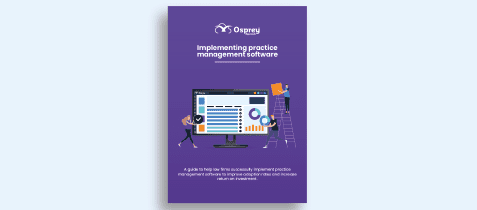Contents
A guide to legal software implementation: 7 factors that impact how long it takes?
We recently answered the top six frequently asked questions regarding legal software implementations. In that guide you can find out more information about how much it costs to switch software, what’s typically involved in an implementation project, and how to migrate your data.

To help law firms better plan their legal software implementation project we’ve answered the crucial question: how long does it take to implement legal software? This article details how long it typically takes, what can affect the timescale of a project, and how to speed up implementation.
7 factors that impact the timescale of your legal software implementation project
- The level of change management required
If your firm is currently very paper-based and is looking to invest in their first legal software solution, then this may require more time and resources to get initially set up. Effective change management and communication will be key to ensure buy-in from staff, confident users, and full utilisation of the system.
When teams have had the same processes and habits for years, there can be resistance or fear of change. This is why more communication, training sessions, and feedback meetings may be required during the implementation project to ensure success and a ROI.
2. Data cleansing
The amount and quality of the data you wish to transfer will impact the timescale of your software implementation. Data migration can often cause delays if the data hasn’t been previously cleansed or reviewed before the project begins.
The accuracy and quality of the data you import will directly affect how effective your reports and financials will be in the new system. It’s for this reason we recommend cleansing your data before starting the project. To ensure you only import relevant and up to date data, it’s important to review your existing database.
If you pre-cleanse your client and financial data before the project begins, it’ll be easier and quicker to convert data into the new system’s structure. Sending samples of your existing data set to your chosen provider early in the process will enable more time to test and trial imports for accuracy.
3. Employee training
The technical ability of your staff will affect how much training they’ll require before they’re ready to go live on the software. This will therefore effect the timescales of your project. They’ll be core training that is required to get set up on your new system, but if your team are tech-savvy and have used legal software previously, then training programmes may be shorter.
To better plan your training and ensure all employees are ready to use the system at go-live, work closely with your software partner to build a training programme that’s suitable for all individuals. Consider having regular tests or reviews to track progress. We also recommend pairing employees so technically advanced individuals help those that are not yet as confident.
Multi-channel training programmes can also help so staff can learn in a way that suits them. They can choose to attend trainer led session, group training, take online courses, or watch how-videos to suit their schedule and needs.
4. The size of your firm
The amount of practice areas your firm services and the number of employees you have will affect the overall time it takes to implement new software. There are a number of reasons for this, including the amount of data to transfer, the number of employees to train, and the number of documents and workflows that will be added. If you’re running a larger firm or you have multiple branches, it is crucial to plan as far ahead as you can to managing the time scales of your project.
5. Cloud software vs an on-premise system
Choosing to invest in cloud software or an on-premise system will affect many things for your firm including price, maintenance, and business continuity. But, when it comes to the implementation time, the solution you choose doesn’t typically impact project timescales.
Whether you currently use cloud software or an on-premise system, it’ll require the same data migration, training programmes, and configuration time to implement a new cloud solution.
6. Communication with your software partner
The effectiveness of communication between your firm and your software partner will impact the progression of the project. There are a lot of moving parts during an implementation project, especially at the beginning, so responsive two-way communication is key to gather the information needed, schedule meetings and training, and discern all the requirements you will need.
We recommend assigning a dedicated project manager within your firm who will be the primary communicator with the supplier to help improve the collaboration. If the project isn’t a priority for someone within your practice, the timescale of your project will likely be impacted.
Communication will also help to secure your ideal go-live date and training days, as you’ll be able to plan them early with your chosen supplier.
7. Planning and preparation
Based on decades of experience migrating law firms to new legal software, the level of planning and preparation a firm undertakes significantly impacts the timescale and success of a project. To help speed up your project, we recommend thorough planning before the project begins:
- Communicate your project plans with your team as far in advance as possible
- Take time to review your existing processes and identify areas for improvement
- Review and cleanse your existing data
- Schedule training sessions
- Consider the integrations that will be essential for your operations
Above all else, make sure your team is prepared for the change. It doesn’t matter how large or small your firm is; the more your firm plans and prepares for training, data migration, and internal process change the easier and quicker the project will be.
Speed up the implementation of your new legal software
Various factors influence and impact the time it takes to implement new legal software into your law firm. Whether you’re implementing software for the first time or you’re switching systems across multiple branches, there are a variety of factors that will impact the project’s timescales.
However, to have more control over your implementation timescales, preparation is key. Clear communication, early data cleansing, and effective planning will help to avoid delays and ensure a smoother implementation process.
Find out if Osprey Approach is the right solution for your law firm and book a free consultation today with our product experts and discover the financial benefits for your law firm.
For more information on implementing legal software at your law firm, check out all parts of our legal implementation guide:
Part 1 – 6 implementation FAQs answered
Part 3 – How to simplify data migration
Part 4 – How much does legal software cost?
Part 5 – How to effectively train your staff




